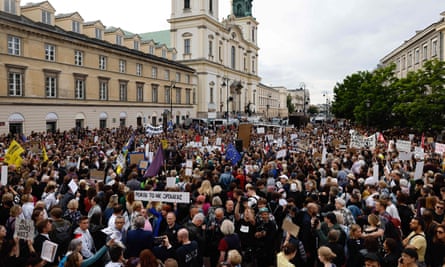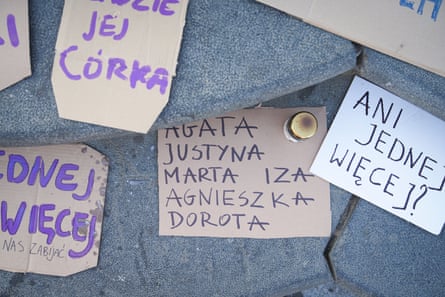[ad_1]
“Stop killing us,” protesters across Poland chanted this evening, demanding the legalisation of abortion, after reports reached the media of a pregnant woman’s death in a hospital in May.
On Monday, Poland’s patients’ rights ombudsman, Bartłomiej Chmielowiec, said that the John Paul II hospital should have told 33-year-old Dorota Lalik that her life could be saved through an abortion. The hospital violated her rights by withholding the information, the ombudsman ruled.
The woman died in the hospital in Nowy Targ, in the south of the country, on 24 May, three days after her admission.
“No one told us that we had practically no chance for a healthy baby … The entire time they were giving us false hope that everything will be OK … that [in the worst case] the child will be premature,” Lalik’s husband told Polish media. “No one gave us the choice or the chance to save Dorota, because no one told us her life was at risk.”
In 2021, a 30-year-old identified as Izabela died in the southern town of Pszczyna in similar circumstances after being denied an abortion, sparking protests and drawing attention to the way a 2020 ruling affects pregnancies with complications.
Abortion continues to be legal in Poland if the pregnancy poses a risk to the health or life to the pregnant person, or is a result of a crime such as rape or incest. However, in 2020, Poland’s constitutional tribunal judged as unconstitutional abortion due to foetal abnormalities. This ruling has had a “freezing effect” on Polish doctors, according to Jolanta Budzowska, the lawyer representing the families of Lalik and Izabela.

“If [the doctors] carry out an abortion too early and the prosecutors then decide that there was no danger to the mother, they can face up to three years in prison,” she told the Guardian in 2021.
Marta Lempart, founder of the All-Poland Women’s Strike, which organised many of the protests, said: “All pregnant women are in danger the moment they’re referred to a Polish hospital. We are afraid of all doctors, because we don’t know which ones will act to prevent their patient’s death.
“This is another hospital death caused by the decision of doctors to deny access to a legal abortion. We again saw the doctors lie and deceive the family and wait passively as the patient died of sepsis,” she said.
“The anti-abortion legislation in Poland is very restrictive,” Lempart added. “But doctors are denying access to abortions that are legal. Their interpretation of the law is stricter than the government’s.”
The Polish ministry of health has responded to Lalik’s death by asking “a team of experts … [to] issue more detailed standards” for obstetricians.
“In Poland every woman whose health and life is in danger has the right to terminate her pregnancy, that is, have an abortion,” the health minister, Adam Niedzielski, said on Monday. “Health does not only mean physical health, but also mental health,” he added.
Lempart said: “It is difficult to say that this situation is just the fault of the government when doctors are refusing to perform abortions permitted by the law in cases when not only the health is endangered but even life.”
In 2005, the then-director of the hospital in which Lalik died reportedly announced that the hospital would not perform any abortion as the procedure contradicted “God’s law and the pope’s teaching”. No abortion has taken place at the hospital since at least 2018, the Polish media outlet Gazeta Wyborcza reported.
The current director of the hospital, Marek Wirzba, is a local councillor of the rightwing Sovereign Poland party, which has been described as “Catholic-nationalist” and supports a ban on abortion.

The hospital has denied that either Wierzba’s political allegiance or the papal patronage contributed to Lalik’s death.
“Since the protests in 2020 everybody in Poland knows the number to Abortion Without Borders [an organisation that provides abortion pills],” Lempart said. “But not everyone realised that if you’re pregnant and you go to a Polish hospital you might not leave alive. That you have to go prepared; you need to have a number to a lawyer and contacts with the media ready, and you have to keep fighting and arguing and not believe a single word anyone says because you might not stay alive.
“This is why we are protesting. We want to raise the alarm: if you are pregnant this could happen to you, if you’re not prepared to fight for your life.”
[ad_2]




